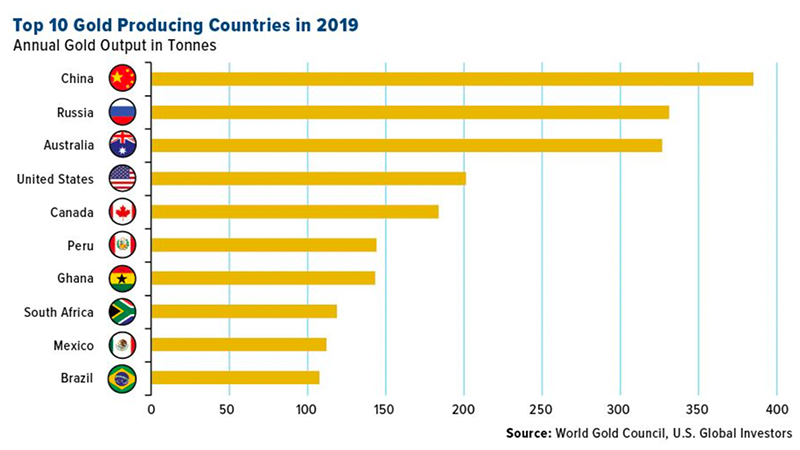As one of the rarest elements in the world, gold makes up about 0.003 parts per million of the Earth’s crust. Gold mining operations occur globally in widely varying types and scale, but substantial new discoveries are rare and production levels are increasingly constrained. Countries all over the world are also seeking non-toxic alternatives to cyanide and mercury to produce gold safely and sustainably.
It is widely believed that all the “easily accessible� gold has already been discovered and exploration firms need to dig deeper to extract economically viable deposits. In 2019, global gold mining output was reported at 3,463.7 tonnes, down one percent from the year prior, marking its first year-on-year decline in output since 2008. 1
As seen in the chart below, China remains the global leader in gold production. But even with 383.2 tonnes of gold production, China’s 2019 figures represented its third consecutive year of declines. The output was down from nearly 400 tonnes in 2018, and the drop was attributed to tighter environmental policies imposed by the Chinese government. Stricter control over the use of toxic cyanide at Chinese mines have forced several mines to cut back on production output. Cyanide usage has also been banned in many other countries, especially in Europe, and this has resulted in the proliferation of stranded assets where mining operators find difficulty in extracting gold profitably.
With their large mines, Russia and Australia have still managed to post increased production outputs. Other countries, such as Ghana, Peru, and Brazil, remain within the top ten gold producing countries in 2019, though they face challenges in dealing with illegal mining activity and potentially lower grades at existing projects. This has an impact on the productive life of a mine, in which ore is extracted, processed, and refined into gold.
As most of the world’s gold is extracted from large mines, more gold is recovered by cyanidation than any other process. This process involves the use of extremely toxic cyanide, for which mining operators are then compelled to construct and maintain potentially dangerous tailings facilities to hold in cyanide-contaminated slurries.
Though the International Cyanide Code lays out safe management guidelines on cyanidation mill tailings and leach solutions, a cost-effective and non-toxic gold recovery reagent by Clean Earth Technologies is now available as a clean, sustainable, and effective alternative to cyanide, and utilisation of a dewatering process will also enable mining operators to relieve themselves of the need to construct tailings dams. Clean Earth Technologies’ gold recovery reagent has been put through rigorous validation processes, and is also scalable to suit mines of different sizes. It can also work in artisanal and small-scale mining outfits by eliminating poisonous mercury from the smelting process.
Clean Earth Technologies has been building momentum in advancing its non-toxic mining livixiant and processing technology, and anticipates a dramatic increase in the number of artisanal miners and large-scale mining operators producing Clean GoldTM. For more information on the breakthrough cyanide-free and mercury-free ‘clean gold’ process, click here.
____________________________
[1] For a list of the top ten gold producing countries in the world, see, “Top 10 Gold Producing Countries,� mining.com, September 24, 2020, ​https://www.mining.com/web/top-10-gold-producing-countries/​.




